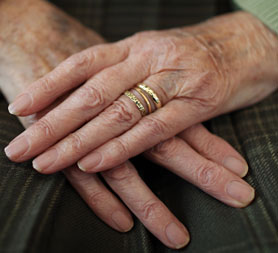Alzheimer’s drug U-turn welcomed
People with mild symptoms of Alzheimer’s could find denied drugs accessible on the NHS after a U-turn by heath officials. Campaigners tell Channel 4 News the decision gives hope to sufferers.

Campaigners said it was a “momentous day” for Alzheimer’s sufferers after the health watchdog NICE said new medical evidence meant GPs could potentially now prescribe previously denied drugs.
Three branded drugs – Aricept, Reminyl and Exelon – could now be prescribed to people suffering the early stages of Alzheimer’s.
The National Institute for Health and Clinical Excellence (NICE) caused controversy in 2006 and 2007 when it ruled the key medicines would only be available to people in moderate stages of the disease.
Campaigners argued it was “cruel and unethical” to force patients with early-stage Alzheimer’s to wait until they became worse before they could get the drugs.
Today, NICE published new draft guidance saying the medicines should now be made available to people with mild disease – potentially benefiting thousands of sufferers.
The guidance, which is subject to appeal, says Aricept (donepezil), Reminyl (galantamine) and Exelon (rivastigmine) will be made available to people with mild as well as moderate disease.
It also recommends the use of Ebixa (memantine) for severe disease and for some patients with moderate disease. Previously, it was only on offer to patients as part of a clinical trial.
The drugs, which cost £2.80 a day, have been shown to improve everyday abilities such as planning and paying attention – and for some they can stabilise functions for at least six months.
Groups hail drugs U-turn
The Alzheimer’s Research Trust told Channel 4 News the decision would give all people living with the disease the “best possible chance”.
“These drugs hold the promise of relief from the symptoms of Alzheimer’s for thousands of people and, while not the cure we desperately need, they can still help, chief Executive Rebecca Wood said.
“The Government’s national dementia strategy stresses the need for early diagnosis, so NICE’s proposal could provide swift and much-needed treatment for people with Alzheimer’s in its early stages.
“It’s an irony that clinical research of the kind that has helped realise the benefits of drugs like these remains sorely underfunded in the UK. If we are to produce treatments that can alter the course Alzheimer’s disease itself, rather than just temporary relief from symptoms, then research is our only answer.”
The Alzheimer’s Society hailed the news.
“This decision stands to benefit hundreds of thousands of people,” said Ruth Sutherland, the interim Chief Executive of the Alzheimer’s Society.
“The drugs aren’t a miracle cure but they can make important differences to people’s lives.
“For the price of a cup of coffee they can mean the difference between recognising your loved ones and playing with your grandchildren.
“It is critical that this draft decision becomes a reality and that all people with Alzheimer’s are given the opportunity to benefit from these treatments.”
NICE Chief Executive, Sir Andrew Dillon, said: “Since we published our guidance in September 2007 clinical trials have continued to show the positive effects of these drugs and, in the case of memantine, have reduced the uncertainty about its clinical effectiveness.
“In addition, we now have more information about the costs of living with and treating this very distressing disease, as it progresses through its mild, moderate and severe stages.
“Our increased confidence in the benefits and costs associated with the use of the three drugs for treating mild and moderate stages of the disease has enabled us to make a positive recommendation for their use in mild disease.”
-
Latest news
-
‘I never read anything like that before’: Benedict Cumberbatch new Netflix series Eric4m

-
Thousands buried alive after Papua New Guinea landslide2m

-
Starmer on what he would say to Netanyahu – after Rafah attack7m

-
‘Really heartbreaking, really sickening’: UNRWA on Israeli attack on Rafah refugee camp4m

-
Netanyahu calls Rafah attack ‘tragic mistake’7m

-




